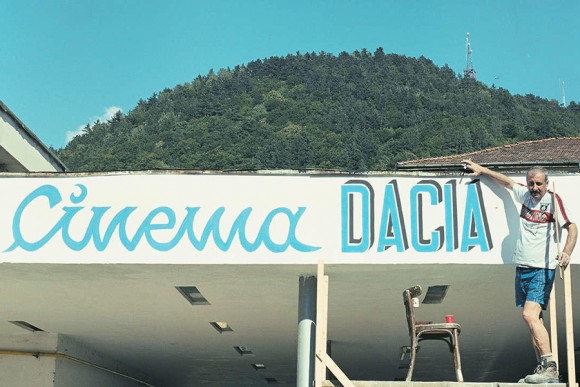Astra Film Festival, taking place this year between 17 and 23 of October, is the main screening platform and a catalyst for the latest documentary film productions in Romania.
The programme DocumentaryTank@AFF (20 - 22 of October), a platform dedicated to members of the film industry, will bring together local and European film-makers in Sibiu for 3 days of networking, masterclass sessions and presentations about the new trends in documentary film production and distribution. Also included in this programme, Romanian Docs in Progress (22 of October) is a competition open to Romanian documentarians who have film projects in the development stage. Six finalists will make presentations of their work in progress before a jury and an audience of local and international professionals. The winning teams receive awards in the form of post-production services and other forms of support for completing their documentary films.
The selection of Romanian documentary films in the AFF 2016 programme takes a look throught the cinematic magnifying glass at the recent history of the country, at its people, and their amazing stories.
A national premiere, The New Gypsy Kings, the latest documentary made by Liviu Tipuriță and produced by the BBC, deals with the complex phenomenon of the music style called 'manele' and the incredible position of the 'manele' singers in Romania. Not only does the film scrutinize the rise to fame of the most well-known and well-paid manele artists “from horse-driven carts to Ferraris and from tents to palaces”. It is as well an investigation into the prosperous industry of manele music, which generates six-figure income, and collects millions of views online.
Self / Family / Society
How did the shutdown of Communist plants in Copşa Mică, the most polluted city in Europe by 2009, affect the life of an ultra-religious family? The Sicreas are more frightened by the bills and bank instalments needing to be paid than by the aggressive pollution which might be the cause for their daughter's debilitating illness. A Mere Breath(directed by Monica Lăzurean-Gorgan) was recently awarded at the Sarajevo Film Festival. In contrast, Chat with Alice (directed by Sandra Isabela Țenț) enters the intimate space of an unusual family of artists: he, a regular of mental institutions and married for the fifth time; she, a highschool graduate and a mother, who must support the family and does it through videochats.
In rural Transylvania, the story of a Roma teenager, Angela (directed by Botond Püsök), reveals the hardships of young women in their community: the lack of education and an uncertain future, gender inequity, and the persistence of controversial traditions, such as kidnapping girls for marriage. How does the fate of pregnant women and the future of children depend on the corrupt, deficient and insalubrious Romanian healthcare system? Pregnant in Romania(directed by Jesús del Cerro) provides an overview through a series of interviews with (future) moms from all milieux.
Refurbished Past
How do remnants of the Golden Communist Age become functional through the efforts of entrepreneurs who have their heart set on upgrading them? Cinema, Mon Amour (directed by Alexandru Belc) looks at the internal reasons for the decay of film theatres in Romania, through the example of a cinema theatre in a province town. Cinema Dacia is one of the few theatres still running, and a dramatic question arises: What happened to more than 400 public film theatres? Where and how have they vanished after the fall of Communism? The film The Block (directed by Maria Șalaru) alternates between the past of a residential area of Communist apartment blocks and the daily reality of the dwellers under the rigorous coordination of a tough and industrious block administrator.
Communist Faiths
The history of the Communist regime in Romania, still obscure and distorted, is explored by documentary filmmakers in their attempt to present a history that is based on verifiable truth. The Red Empress – The Life and Adventures of Ana Pauker(directed by Radu Gabrea) portrays ”the most powerful woman alive” as TIME Magazine called her in 1948, debunking the extremely negative reputation of Ana Pauker, owing to the deceitful propaganda of the Communist regime following her being purged from the Party. God Save the Partisans as We Wait for Americans! (directed by Dragoș Zămosteanu) scans the phenomenon of the fugitive partisans in the 1940s and the 1950s, the main guerrilla group against the horror of the Communist regime, who counted on and put all their hopes in a rescue intervention of the Americans.
Aromanians
Through various approaches, the films Armânii, at the famous Manakia to I’m not famous (directed by Toma Enache), The Manakia Brothers. Diary of a long look back (directed by Eliza Zdru) and Torna, torna, fratre! (directed by Marian Voicu) contribute to getting to know the fabulous community of Aromanians in the Balkans.
”A unique aspect of the Festival is that from its very early days, it has offered an international visibility to Romanian documentary films, viewed and debated upon by audiences and professionals, Romanians and foreigners alike. In the 1990s this was a first; today we are happy to see how people have made a habit out of coming to Sibiu to take the pulse of the latest Romanian productions. I don't belive it to be an overstatement when I say that for 23 years Astra Film Festival has been an inspiration and stimulus for Romanian film-makers and that it has become a launch pad and a catalyst for the Romanian documentary productions”, declared Dumitru Budrala, founding director of Astra Film Sibiu.




















